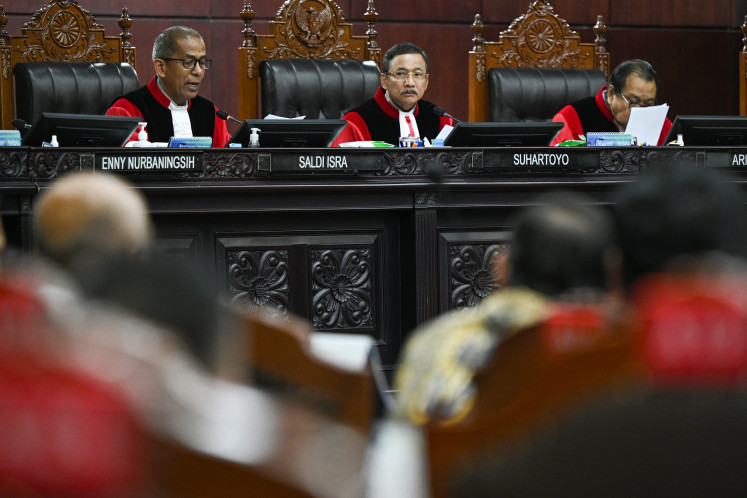Popular Reads
Top Results
Can't find what you're looking for?
View all search resultsPopular Reads
Top Results
Can't find what you're looking for?
View all search resultsRI unfazed by Japan nuclear crisis
Concerns over a possible nuclear disaster in Japan should not deter Indonesia from its ambition to build a nuclear power plant in the future, an official at the country’s atomic agency said
Change text size
Gift Premium Articles
to Anyone
C
oncerns over a possible nuclear disaster in Japan should not deter Indonesia from its ambition to build a nuclear power plant in the future, an official at the country’s atomic agency said.
Hudi Hastowo, head of the National Atomic Energy Agency (Batan), told The Jakarta Post that using nuclear energy was one of the best solutions to address the country’s power shortage issue. He played down the safety issue that anti-nuclear activists have been voicing, saying that it would be safe to have one.
“We should think 20 years ahead. What will we do then to fulfill the electricity demand?” he added.
Indonesia, located in the Ring of Fire and therefore prone to massive earthquakes that can trigger tsunamis, has been planning to build a nuclear power plant, although locals and environmental activists oppose the plan.
The country experiences frequent electricity shortages characterized by rolling blackouts. To address the problem, the government launched the first 10,000-megawatt power program, with all proposed power plants to be coal-fired.
Chalid Muhammad from environmental NGO Indonesia Green Institute said that the government should stop the plan to build the reactor because 83 percent of Indonesia’s area was prone to disasters such as earthquakes and tsunamis.
“The government should focus on building decentralized power plants that use renewable energy sources, such as microhydro and geothermal plants. Those small-scale plants can fulfill the electricity demand and are a lot safer compared to larger sized plants,” he said.
Hudi argued, however, that the government could not use only one or two energy sources, saying it needed to expand beyond these, emphasizing that nuclear energy could produce a large amount of electricity supply.
“People always say that we should use renewable energy sources such as geothermal energy, but to what extent can it meet the demand? We will use all kinds of energy sources, we need to diversify,” he insisted.
The government has conducted several feasibility studies on nuclear power plants, including those used in South Korea, which uses the Pressurized Water Reactor system.
The reactors used in the Fukushima Daiichi Plant in the northeast of Tokyo, Japan, is the Boiling Water Reactor, which is another type of light water reactor. The plant first began operation in October 1970 and was originally scheduled to be shut in February but had its operation license extended for another 10 years. Hudi said that the problem in Japan’s reactor was not caused by low-level technology, but the catastrophic tsunami following the 8.9-magnitude earthquake last Friday.
“The facility stopped operation when the earthquake hit. But the tsunami swept the cooling system away so the release of the residual heat inside the reactor could not be stopped as planned,” he said.
He assured that the technology used in an Indonesian nuclear plant would be the most up to date, adding that a safe location played an important role in the plant’s security. “If we use state-of-the art technology but place it in a dangerous location, the facility will face the same risk as a less sophisticated one. We have to find a location that suits international requirements, including one that is safe from tsunamis and other natural elements,” he said.
The government has been conducting a land analysis to find the best location for the plant. Among the location options are Muria Peninsula in East Java and Bangka Belitung province.
“Muria is just one of many options. If the people reject the facility, we can’t force the plan,” Hudi said.
After the nuclear crisis in Japan, environmental NGOs in France and Germany have been holding anti-nuclear rallies, saying that what happened in Japan could also happen in their countries too.










